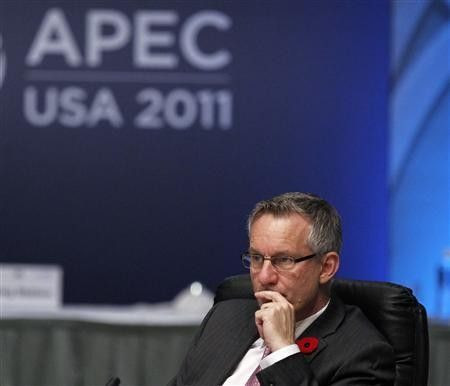Canada, Mexico eye joining US-led Pacific pact

HONOLULU (Reuters) - Canada, Mexico and at least two other countries have expressed interest in joining U.S.-led talks for a pan-Pacific trade pact, a U.S. Republican lawmaker said Friday after Japan asked to take part.
There's a good deal of momentum for the TPP (Transpacific Partnership), Representative Kevin Brady said after meetings with members of President Barack Obama's administration at the annual Asia-Pacific Economic Cooperation (APEC) forum.
That momentum was evidenced by Japan's announcement earlier Friday that it was interested in joining the talks and what seem to be very solid inquiries from Canada, Mexico and a few others, Brady said.
Brady said he was told the Philippines and Papua New Guinea also expressed interest in joining the negotiations that now include the United States and eight other members of APEC.
New countries joining the TPP talks would underline the importance of a regional pact as a vehicle for fostering free trade when global talks have all but failed. Japan in the TPP would create a potential market at least 40 percent larger than the 27-nation European Union.
Obama and leaders from the eight other TPP countries -- Australia, New Zealand, Vietnam, Singapore, Malaysia, Brunei, Chile and Peru -- will meet Saturday to discuss progress so far in the talks.
Brady, a leader of the APEC caucus in the House of Representatives and chairman of a trade subcommittee, said he hoped the leaders would set a goal of concluding a deal by mid-2012 but said he did not know if they would.
Adding new members could slow the process significantly.
Brady said Japan and any country that wants to join at this point is going to have to speed up and merge.
Japan will have to show it is willing to move on long-term barriers to its auto, insurance and beef markets before U.S. lawmakers will back an Obama administration decision to begin talks, he said.
U.S. procedures require the Obama administration to give Congress 90 days of notice before it enters into trade talks with any country.
While the United States, Canada and Mexico already are partners in the North American Free Trade Agreement, moving them into the TPP would increase the heft of the pact.
But TPP negotiators are dealing with a raft of new issues -- including the role of state-owned enterprises in trade, government innovation policies and cross-border data flows -- that have arisen since the NAFTA pact.
Washington does not have a free trade deal with the Philippines or Papua New Guinea.
Brady said he welcomed the interest of new countries in the TranspAcific Partnership pact.
It is critical America be engaged in the Asia-Pacific if we want to be competitive in jobs in the future, he said. This is where much of the world's growth is going to occur.
(Reporting by Doug Palmer; Editing by Stella Dawson and John O'Callaghan)
© Copyright Thomson Reuters {{Year}}. All rights reserved.




















